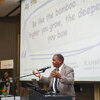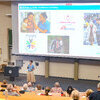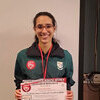Global citizenship: ‘Experiencing the world outside my bubble’
13 October 2020 | Story Helen Swingler. Photo Getty Images. Read time >10 min.
A virtual joint global citizenship course hosted by the University of Cape Town (UCT) and the University of the Witwatersrand (Wits) reflects how and what students think about citizenship – in their personal lives, in their approach to their studies and research, and as a response to COVID-19.
The four-week course ended shortly before President Cyril Ramaphosa’s announcement that the country would move to COVID-19 lockdown Level 1 from midnight on 20 September – a step towards a ‘new normal’.
What will the ‘new normal’ in a COVID-19 world demand from students? How should they think about the future vis-à-vis social justice, their roles and positionality in the world, their roles as change agents and the challenges attached to youth activism?
These were the topics of four week-long modules in the “GC4: Dialogue and active citizenship in unprecedented times” course – a partnership between UCT’s Global Citizenship Programme and Wits Citizenship and Community Outreach. Fifty students signed up.
“This sharing helps students see their peers at other institutions as partners in their shared vision to lead change for South Africa’s future.”
The UCT–Wits collaboration is not new. Karuna Singh, the senior programme adviser for Wits Citizenship and Community Outreach, said that a joint eight-week “Global Citizens for Social Justices” programme has been offered before.
The GC4 programme provides a lens through which to understand persistent inequalities across multiple spaces – and even more so now during this unprecedented time of the COVID-19 pandemic.
“This year’s collaboration was initiated by UCT and is significant because it brought together student cohorts from UCT and Wits, who shared experiences about their community engagement and activism. This sharing helps students see their peers at other institutions as partners in their shared vision to lead change for South Africa’s future,” Singh said.
“Sharing in the context of the Global Citizenship Programme has also helped groups understand the differences in experiences and the different cultures that exist at the two universities. We hope that through the programme Wits and UCT students will connect to build partnerships for change in South African society.”
Inter-institutional space
Janine Carlse, a PhD candidate (education policy studies) and lecturer in the UCT Global Citizenship Programme, said that they aimed to explore what it means to be a social change agent in these times and to open an inter-institutional space for students – our future leaders – to discuss these issues.
The exchange is important against a global backdrop of greater collaboration between citizens, civil society and the state.
The facilitators also learnt from their interactions with the student participants, Carlse said, particularly what motivates their activism and community engagement initiatives.
“The collaboration has also been an opportunity to merge institutional approaches to active citizenship.”
“The collaboration has also been an opportunity to merge institutional approaches to active citizenship in co-creating a space for open dialogue, exploration and putting ideas into action. We envision that this partnership will continue in 2021 and beyond, and hope that over time we can include students from more South African universities.”
Faith Gara, a facilitator and second-year MPhil (Environmental Humanities South) candidate at UCT, said that the GC4 programme has enriched her thinking and her approach to research. Her master’s thesis is part of the transdisciplinary Liveable Neighbourhoods project, which aims to redesign Hout Bay using a water-sensitive framework.
“I was first involved with GC4 in 2018 when I was still new to UCT and starting my master’s studies … What attracted me were the fundamentals of active citizenship, [which are] lacking in my academic courses and career, but [are] needed to pursue my research interests. The GC4 course has moulded me; I’ve become aware of different ways of being in the world and embracing diversity, which helps me value many ways of knowing in my research.”
“I’ve had the privilege of learning from Wits and UCT students through conversations on different forms of engagements.”
Gara said that she’s been prompted to take a step back to reflect on why she does research, how she conducts fieldwork and what new knowledge she can bring to this work.
“For me, active citizenship is actively changing a rigid paradigm of researching to a more flexible approach that is just and inclusive of diversity and allows meaningful interventions that embrace the communities’ values and needs.”
Earlier this year, Gara participated in the Global Citizenship “Decolonising Citizenship” facilitation course, which explored what it means to facilitate in a decolonial space. This opened an opportunity for her to facilitate the 2020 GC4 course.
“I’ve had the privilege of learning from Wits and UCT students through conversations on different forms of engagements.”
Critical lens
UCT BSc (engineering) student Callum Tilbury has always been interested in activism. The problem was knowing how, when and where to jump in. The GC2 programme in the first semester made him rethink activism completely.
“From the ground up, I was encouraged to understand my positionality, what constructive and sustainable activism actually looks like, and my role in such movements. Feeling motivated after that course, I was excited to press deeper, understand more and grow further – hence GC4!
“I have started the process of interrogating my own thoughts, biases and unchecked beliefs.”
“It’s challenged me to think deeper about the world. Through the gentle prompts of the course facilitators, the insightful pre-session readings and the thought-provoking group discussions, I have started the process of interrogating my own thoughts, biases and unchecked beliefs. This has naturally manifested in the way I talk, the way I act and even the way I read – trying now to consume content with a critical lens.”
This changed the way he thinks about his degree.
“I have come to realise that engineering is as much of a social science as it is a physical science. Often, traditional scientists and engineers try to silo themselves away from the nuanced, deeply complex and messy world of ‘people’. It is certainly simpler to focus solely on equations – things that can have defined answers and neat solutions. But I believe that misses the point: engineering and people are inextricably linked.”
He added: “In fact, I am incredibly fortunate to be in a discipline where I can directly apply my skills to solve tough contemporary challenges. Moving forward, I am excited to embrace a multi-disciplinary approach to 21st-century problems – understanding both the highly technical and tricky social aspects of emerging technologies.”
Enriched worldview
Wits BSc (biological sciences) student Jeremia Tsotetsi said that sharing knowledge with delegates from two of Africa’s top universities was invaluable. It opened his eyes to the difference between altruism and activism.
“To be honest, I already was doing good, but I never saw myself as an activist.”
“I have learnt a lot about change agents (activists) [and] how I personally can help make the world become a better place. To be honest, I already was doing good, but I never saw myself as an activist. After this course, I’m going to register [for] the programme that I was doing, [help] disadvantaged learners from rural areas align and adapt to change when they come to university and give them information that we know they don’t have access to.”
The GC4 course also changed the way he thinks about his degree.
“I’ve always wanted to help people, always wanted to do research on medicine that can help cure diseases that are said not to have cures. This course inspires me to do more … I don’t want to help people only from behind the curtains. I want to get out there, help face and deal with challenges faced by our nation – help as much as I can.”
Learning about deeper issues
Lesego Ramailane, a third-year BCom (politics, philosophy and economics) student at Wits, said that she wants to be a change agent and pioneer in order to bring good to the world. She joined the course to engage with other people who have similar objectives but different perspectives.
“I joined the course to kind of validate my passions … to know and be certain that I’m on the right track. I was also attracted to the course because I want to start making the change in my communities,” she said.
“I believe that now I am thinking more like an active citizen concerned with becoming better for the sake of others and myself. In the last week of the course I learnt about the deeper issues of climate change – that it’s not just about the weather getting hotter; there’s so much more to it.”
“I’ve grown to acknowledge, love and appreciate the knowledge and insight I’ve gained from my degree.”
There was a time when she doubted her degree choice and questioned whether it aligned with what she wanted to do.
“At the beginning of this year and over the four weeks, I’ve grown to acknowledge, love and appreciate the knowledge and insight I’ve gained from my degree. It has touched on how important it is to first understand the world I’m living in before I try to change anything.”
Not only one right answer
UCT final-year law student Rozelle Wentzel signed up for the course because it focused on how to maintain active citizenship and dialogues around activism in a time of COVID-19.
“GC4 has taught me that perspective is everything. It showed me the need to experience things outside my own bubble and to appreciate dialogues from different perspectives. While I am very sure of who I am as an activist, the course expanded my ideas of what I can accomplish and showed me new ways of applying my own thoughts, ideas and initiatives.”
It also changed the way she approaches her law studies.
“I now realise that there is not only one right answer or way to do something – but a wide variety depending very heavily on one’s own context and perspective. It also showed me the importance of being an activist [who] continually [educates herself] on issues of the day – to become a better and more impactful activist.”
She has also become more open to other ideas and perspectives.
“It was quite inspiring and thought provoking to hear what kind of projects Wits students are involved in and to draw comparisons with what we do (and can do) at our home varsity. In many aspects, UCT and Wits are very similar universities, but GC4 gave us an opportunity to engage and open dialogues with students who are not confined to UCT.”
 This work is licensed under a Creative Commons Attribution-NoDerivatives 4.0 International License.
This work is licensed under a Creative Commons Attribution-NoDerivatives 4.0 International License.
Please view the republishing articles page for more information.



























































































































































































































































































































































































































































